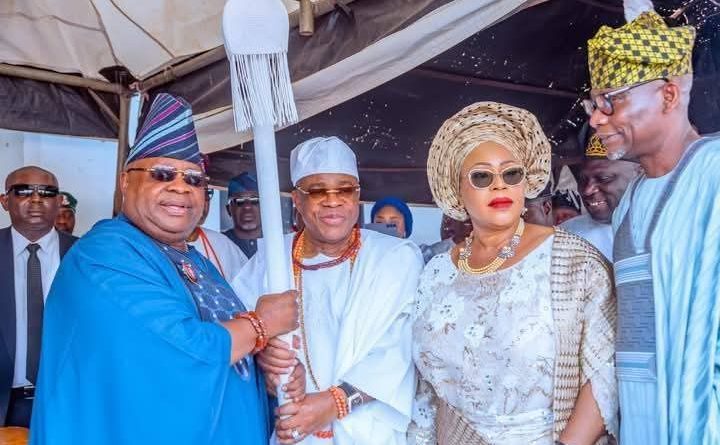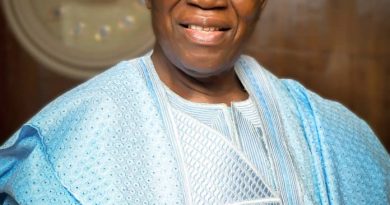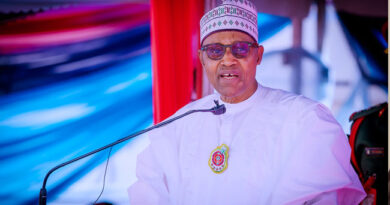Haastrup:King Of Ijesha; Prince Of Denmark?-By Akin Adeoya
“Haastrup is reported to have grown in prestige both as a civil and martial leader in the Ekiti ranks, third only to the supreme commander himself, Ogedengbe and his No 1 lieutenant, Faboro”
Is there any possibility that a European monarch will adopt and take the throne with a name like Obasanjo, Abacha or Abdulsalam? For example, King Julius Obasanjo of some kingdom in western Europe of even King Ajimoko of Denmark, as in our poser. Not likely.
When I first read the announcement that Prince Adesuyi Haastrup, an illustrious Prince of Ijesha and distinguished son of Nigeria was going to be installed as the Owa of the highly revered Ijesha throne, I was immediately seized of a nagging question, is the new Owa a great grandson of a European? My simple mind could not immediately process the possibility of an Ijesha monarch carrying a European surname. Ex-slaves do. But even if his forbear was one, I would expect that a Prince who was enslaved and ended up with a vestige and badge of slavery would, as a categorical imperative, upon achieving his freedom, revert to his royal identity.
Its either Africans don’t understand the relevance of identity and the powerful symbolism of names, or there is a fascination with foreign names and identities, even if lined with the vestige of the humiliation of slavery that we would rather carry on that identity almost as if confirming the thoughts of the Whiteman that everything white is superior to anything black.
Don’t get me wrong. There are countless returnee family names with European, Brazilian or Spanish identity. Many of them have chosen, for their own reasons to keep the names. Many of them are proud of the names. Maybe it gave the owners some advantage in the colonial era. Maybe they continue to enjoy some advantage or even prestige in the post-colonial era, even till this day.
In a colo-mentality (Apologies to Fela) dominated society you can understand that. But we can also argue that these people had no real fallback option. Many of them probably could not trace their real families again so which name should they adopt? Except they want to follow the example of Mohammed Ali in faraway America who denounced his slave heritage of Cassius Clay and adopted the name that gave him a fresh identity on his meteoric rise to fame and fortune as one of history’s greatest pugilists.
Or Malcolm X. Or my old principal in Methodist Comprehensive High School, Aaye-Ekiti, who just got fed up of being addressed as Mr Alexander that he changed the family name to Ogboja, a very traditional nuanced Ekiti name. I am hoping my good friend Debola Ogboja or his sister Bisi Ogboja-Ade Olowoniyi, will do us the honor of breaking down the deep meaning of that now revered name from a well-respected and highly educated Ekiti family. By the way, Baba Ogboja is still alive and kicking at well over 90 years in his native Osi Ekiti. May his tribe increase.But these are not even princes or monarchs. They only represent themselves. Blue bloods, on the other hand, personify the culture, religion and essence of the people they rule. Their very appearance, utterances, relationships and especially names must all be carefully choreographed to reflect the people and nations they rule over. Every apparel they wear, every word they utter and the identities they carry must be traceable to the roots of the kingdoms they rule.So when my 16 year old son poses the question:
“Is the new Owa Obokun a European?” What do I say to him?Now, a little history. Let us meet the original Haastrup, a true prince of Ijesha and an Ekitiparapo warlord (Ijeshas are actually Ekiti people by the way, even though they got split into Osun state, just like the Okun of Kogi state). History recalls the original Prince Haastrup as one of the top generals in the EkitiParapo war that tore the Yoruba nation to shreds. The war was a war of liberation where all the Ekitis decided to rebel over their Ibadan overlords. The Ibadans would not back down and so began a most fratricidal confrontation which unveiled some of the most brilliant military tacticians that Nigeria has seen from the Ekiti side. These were led by Ogedengbe Agbogungboro of Ijesha, Fabunmi of Oke Imesi and Faboro of Ido Ekiti.
Prince Haastrup, a successful Lagos elite helped to mobilize funding and strategic support for the war effort and then proceeded to join the fray as commander of the rifle corps that did considerable damage to the opposing army. In fact, history records it that Ibadan forces suffered untold fatalities from the Ekitiparapo sharpshooters. It was the first time European weapons were used in a Yoruba armed conflict and its use had a debilitating impact on their Ibadan oppressors.For this reason, Haastrup, Doherty (another European name by the way, for an indigene of Ijero-Ekiti) and the Ekitiparapo Society of Lagos can in no small manner be commended for the great show of support for the Ekiti forces; this, especially in helping to procure guns and ammunition.
Haastrup is reported to have grown in prestige both as a civil and martial leader in the Ekiti ranks, third only to the supreme commander himself, Ogedengbe and his No 1 lieutenant, Faboro.So it made sense that when the then Owa Obokun of Ijeshaland, Owa Alowolodu joined his ancestors, Prince Haastrup took the throne (April 1896) with the name Ajimoko 1 (A shorter variant of the original appellation, “Ajimoko bi Oyinbo”, meaning he who steers a boat like a white man, a reference to his dexterity which is at par with the perceived superior skills of the whiteman!
Now where did it all begin? I checked online and here is what Wikipedia offers: “The name Haastrup came to Ijeshaland with Frederick Kumokun Adedeji Haastrup, a prominent figure in Ijesha history”, then the perplexing bit: “He was of Danish descent and adopted the name Haastrup from his Danish father. His full name was initially Frederick William Haastrup. He later embraced Ijesha culture and became known as Kumokun, also using the name Adedeji. The name Haastrup, therefore, became associated with him and his descendants in Ijeshaland”.
Of course this is not to be taken seriously, I only draw attention to it to highlight some of the serious identity problems traceable to the subject at hand.
There are further, more credible accounts of a Captain Haastrup, whose ship reportedly rescued the young prince and repatriated him to Sierra Leone. This story could not be confirmed as the origin of the name but it was eventually tied to a 29 year old missionary who arrived Sierra leone in 1841 and was most likely our young Prince’s mentor and whose name he now adopted. His name was Haastrup.
Prince Adedeji Haastrup eventually found his way to Lagos, where he reconnected with his royal roots and became a prominent and highly successful trader, and ultimately to Ijesha, where he became a soldier and ultimately the King of the Ijeshas. The big question remains for me, why would a royal retain a foreign name that has no connections to the kingdom he rules, a name he has now bequeathed to posterity where we now have a prominent Yoruba Oba bearing a Danish name from some obscure European village. Does it fit? Let me hear from you.
_Akin Adeoya is a Fellow of the National Institute of Marketing of Nigeria(NIMN) and publisher of M2(Marketing Magazine)_




